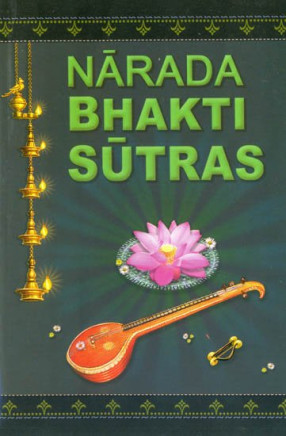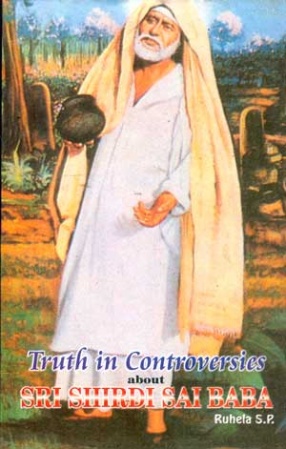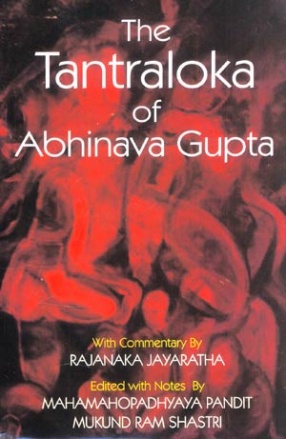Narada Bhakti Sutras
IN FEBRUARY 1940, the present work, appearing for about a couple of years as a serial in The Vedanta Kesari, was completed. Since then there has been continuous call for it in book form. After considerable revision, a provisional edition of it is now issued to meet this demand. As it is, the book now comprises two parts. The original aphorisms, as constituted from four previous editions, are printed first in Devanagari alphabet, chapter by chapter, along with their word-by-word meaning and English rendering which aims to be faithful to the spirit of the original rather than to the letter. The division into five chapters is also based on variant readings too noticed in them are indicated in the body of the book itself within brackets. It has been intentionally made so to make the book welcome to the lay reader who has no the equipment to penetrate to the important arguments of the Sanskrit text through the hurdle of exegetical appurtenances. The Notes which come as the second part run over fifty-thousand words and constitute the major portion of the book. Attempt has been made, in this part, to elucidate the text from all possible viewpoints, to note down the syntactic sequence, to canvas the sense of the various significant expressions, to evaluate the doctrine in the light of allied literature, and to answer the doubts and objections which are likely to arise in connection with the various points discussed. One may modestly say that this divisions of the publication is a mine of information on almost all matters connected with religion and spiritual life. The writer has spared no pains to make the explanations specially useful to the intelligent modern spiritual aspirant who cannot insulate himself from the scientific atmosphere in which he is brought up, and who, besides, is not prejudiced against religion so as to flout its authority simply because it partly 'rest on tradition. The explanations are therefore made, as far as possible, rational, in line with possible experience, and copiously documented. Under the circumstance a large number of extracts from Sanskrit scriptures and mystical writings of other religions had to be incorporated. These chations show, by the way, the universality of the religious experience itself in all its levels, and reassure the aspirants of all classes about the reality of their quest. One may find a few repetitions and some divagations here and there. They are intentionally retained to stress some of the important points from different bearings and fresh settings, as well as to dispel the doubts that are likely to assault the novitiate in spiritual life while pondering over the various problems discussed under each aphorism. Remembering all these specific features this part may be considered a distinct work. It is a matter of regret that we were handicapped in various ways in dealing with all the references in a uniform manner. One would have wished very much to reproduce all of them in full along with the translation of all the Sanskrit passages. This could not be done in this edition owing to certain difficulties. Nevertheless most of the quotations of an illustrative character have been printed in full with translation or the substance of the original in English, preceding or following the extracted texts. Only a few such texts and translations are left out without the corresponding translations or text, or both. It is hoped that this irregularity will be removed in the next issue. The deficiency of an index and sectional headings are also to some extent made good by different head-lines on each page referring to the leading idea below. To facilitate frequent reference to the text the number of the aphorisms are given in the upper inside corner of each page. It is superfluous to state here anything about this sacred text itself, except perhaps that this precious gem of a tract is a complete and thorough guide book, and indispensable companion, for all sincere seekers after God and the divine life, from the start of their spiritual ascent to the very summit of it. Sri Ramakrsnaparamahamsa has stressed again and again that for Kaliyuga the Path of Devotion as described by Narada is indeed, the best and the easiest. This is but an echo of the experience and verdict of innumerable saints and holy men who have preceded him. The aphoristic statements of Narada are likely to appear to the superficial reader a group of eighty-four recondite devotional sayings. The fact is quite different. For, one will find on examination that all of them fall within a scheme with perfect inner coherence, if one reads bearing in mind the relation subsisting between the various aspects of Divine Love. Supreme Divine Love, together with the steps leading to it, is called Bhakti. The phenomenon of Bhakti therefore has a pre-mature stage, designated as Apara-bhakti and a mature stage of subjective experience known as Parabhakti. Mature Divine Love may be viewed again subjectively and objectively. The transcendental aspect of it is an uncharacterizable, incommunicable, and ineffable experience of unsurpassed bliss and illumination always equated with Self-realization or God-realization. It is also called Liberation-in-Life, or Perfect Gnosis. The marks that may be observed in a person who possesses this perfect realization, when that realization expresses through his moods, thoughts, words, and deeds, are called the objective aspect of Parabhakti. The first chapter of the book describes these various aspects of Parabhakti in twentyfour solemn and lucid aphorisms. In the second chapter this Parabhakti is extolled as superior to all spiritual disciplines, and all who are aspiring after liberation are exhorted to seek after that and that alone. Aparabhakti, or the pre-mature stage of Divine Love, is further subdivided into Gaunabhakti and Mukhyabhakti styled as Vaidhabhakti and Raganugabhakti by Sri Ramakrsna. The former division of this classification refers to a preparatory stage of discipline, and the latter to the most advanced stage resulting from the practice of that preparatory discipline; but both are only means to the highest-realization. While Parabhakti is of the nature of the actual realization of the goal itself, or the full maturation of the whole endeavour, Aparabhakti is a stage prior to the attainment of that maturation; and therefore it involves effort and gradual achievement; it is a process. The most advanced stage of Aparabhakti, called Mukhyabhakti or Ekantabhakti, supervenes upon, the fulfilment of the duties enjoined on the novitiate in the disciplinary Path of Devotion, as a result of Divine grace which then naturally flows into the devotee's heart. This stage prepares the mind of the devotee fully and perfectly for the final realization; and God then blesses him with divine illumination instantaneously. The third chapter sets forth at length with much psychological insight the moral rules and spiritual discipline of Vaidhabhakti which the aspirant ought to practise with meticulous care, unflagging zeal, and unbroken continuity. The aspirant who, as a result 'of the above discipline, has come to have Raga-Bhakti in which God-realization is immediate and inevitable. The closing chapter, which is the fifth, depicts how the Mukhya-Bhakta lives in the world, how the satisfies all beings, what blessings society derives from him, and how God reveals Himself to him as his most Beloved Self and how the Mukhya-Bhakti transforms itself into the Parabhakti. From the above synopsis the logical sequence under-lying the aphorisms is evident. The Divine sage Narada declares to the entire humanity through his auspious gospel, with the anxiety of a great saviour, the existence of Immortal Divine Bliss as the birthright of all; admonishes ignorant man to strives for it, leaving aside all allurements of sense life; instructs the seeking aspirant about the methods by which he may attain to the Goal; heartens the seekers after the Divine with the shining example of the perfect devotees; and assures and gladdens all by his own experience and example how the Master and Lord of all the universe is ever eager to confer upon the earnest and one-pointed lover of God His unconditioned Grace, by the power of which he attains freedom from Samsara and eternal Bliss. May Narada's Gospel of Divine Love in this setting be helpful to many to reach the goal of life.
Get it now and save 10%
BECOME A MEMBER








Bibliographic information